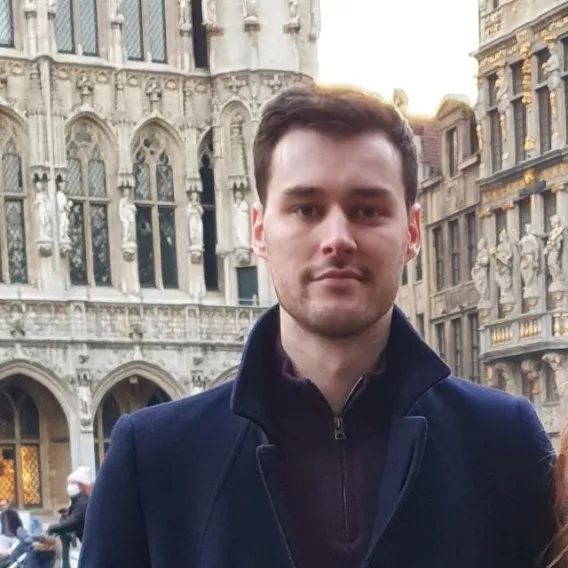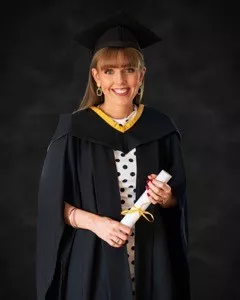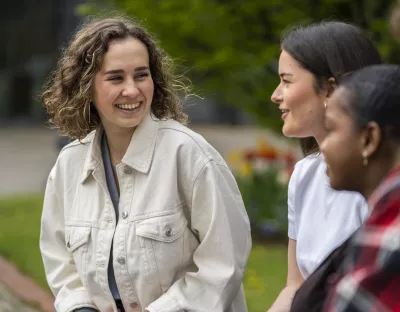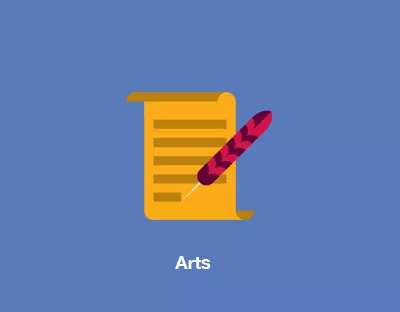Key Info
Bachelor of Arts in Applied Languages
About you
Do you enjoy speaking languages and finding out about the countries in which they are spoken?
Are you also interested in language itself – why languages are different, why people in different places speak differently, how we communicate? Do you enjoy travelling and getting to know other cultures in depth?
Would you like to study three languages or combine your study of two languages with subjects like Law, Marketing or Politics and International Relations?
Would you like to acquire specialist skills, such as Teaching English to Speakers of Other Languages (TESOL) or Technical Communication while you study languages?
If this sounds like you, then Applied Languages at UL could be the course for you.
Why study Applied Languages at UL?
This programme aims to produce graduates with a high level of competence in at least two languages combined with a specialist knowledge of the societies in which those languages are spoken. The course also offers the unusual opportunity to take three languages to degree level. Graduates will also possess professional expertise in an area such as Law, Marketing, Politics and International Relations, Teaching English to Speakers of Other Languages (TESOL) or Technical Communication.
Learn more about our courses and upcoming events
What you will study
Pathways and Electives for Applied Languages
It is compulsory to study 2 of the languages below as core languages. All languages are available at an advanced level, with German, Japanese and Spanish also available at beginners' level.
Along with your 2 core languages, you will generally have 1 additional core module each semester, as well as a professional elective stream and 1-2 literature/cultural elective modules.
In Semester 1:
For your professional elective stream, you must choose one of the following:
- An additional language from the initial list
- Law
- Marketing
- Politics and International Relations
You must also choose one Literature/Cultural elective from:
- Literature in one of the languages you are studying
- Introduction to New Media and Cultural Studies
What you will study
Semesters 1, 2 and 3: You will spend the first three semesters in UL, building a foundation in your two (or three) chosen languages and the societies in which these languages are spoken, as well as in Linguistics, which is the science of language, and in your elective subjects.
Semesters 4 and 5: You will spend semesters 4 and 5 away from UL. You will be on a work placement for the first semester (cooperative education) and you will be studying in a university for the second semester (external academic placement). Working and studying abroad gives you a fantastic opportunity to deepen your linguistic skills and cultural knowledge. Students generally divide their time between their two main languages; so if German and Spanish are your main languages, you could spend your cooperative education in Spain or Argentina for example and spend your external academic placement in a German-speaking country. If you are studying Irish, you may be working in the Gaeltacht or in Irish-medium schools and media organisations. Whatever your language combination, you will get plenty of advice and guidance about these choices and you will start planning them well in advance.
Semesters 6, 7 and 8: During semesters 6, 7 and 8, you will acquire a deeper understanding of the historical, political, economic and cultural factors that have shaped the societies in which your two languages are spoken, while also continuing the study of these languages to a high level of proficiency. You will also acquire specialised, advanced skills such as interpreting and translating. In addition, you have the opportunity in your last 3 semesters to continue the study of your third language/ politics and international relations/marketing, or you can choose to specialise in Teaching English to Speakers of Other Languages or Technical Communication. You can also choose to study literature modules in your second language. In addition, you can choose from a variety of interesting electives in the areas of linguistics, media, sociology, literature and film.
A full year by year breakdown of modules is below:
| Year 1 | Semester 1 | Year 1 | Semester 2 |
|---|---|
| Language, Culture and Society A: French OR German OR Irish OR Japanese OR Spanish | Language, Culture and Society A: French OR German OR Irish OR Japanese OR Spanish |
| Language, Culture and Society B: French OR German OR Irish OR Japanese OR Spanish | Language, Culture and Society B: French OR German OR Irish OR Japanese OR Spanish |
| Linguistics 1 | Linguistics 2 |
| Elective 1: French OR German OR Irish OR Spanish OR Japanese OR Marketing OR Law OR Politics and International Relations | Elective: French OR German OR Irish OR Spanish OR Japanese OR Marketing OR Law OR Politics and International Relations |
| Elective 2: Literature in Language A OR B OR Cultural Studies and New Media | Elective 2: Literature in Language A OR B OR Language and Culture |
| Year 2 | Semester 1 | Year 2 | Semester 2 |
|---|---|
| Language, Culture and Society A: French OR German OR Irish OR Japanese OR Spanish | Cooperative Education |
| Language, Culture and Society B: French OR German OR Irish OR Japanese OR Spanish | |
| Language and Technology | |
| Elective 1 : French OR German OR Irish OR Spanish OR Japanese OR Marketing OR Law OR Politics and International Relations | |
| Elective 2: Literature in Language A OR B OR Cultural Studies |
| Year 3 | Semester 1 | Year 3 | Semester 2 |
|---|---|
| Erasmus/Exchange placement with a partner institution abroad | Language, Culture and Society A: French OR German OR Irish OR Japanese OR Spanish |
| Language, Culture and Society B: French OR German OR Irish OR Japanese OR Spanish | |
| Elective 1 : French OR German OR Irish OR Spanish OR Japanese OR Marketing OR Law OR Politics and International Relations OR Teaching English to Speakers of Other Languages OR Technical Writing |
| Year 4 | Semester 1 | Year 4 | Semester 2 |
|---|---|
| Language, Culture and Society A: French OR German OR Irish OR Japanese OR Spanish | Language, Culture and Society A: French OR German OR Irish OR Japanese OR Spanish |
| Language, Culture and Society B: French OR German OR Irish OR Japanese OR Spanish | Language, Culture and Society B: French OR German OR Irish OR Japanese OR Spanish |
| Applied Languages Project | Applied Languages Project |
| Elective 1:French OR German OR Irish OR Spanish OR Japanese OR Marketing OR Law OR Politics and International Relations OR Teaching English to Speakers of Other Languages OR Technical Writing | Spanish OR Japanese OR Marketing OR Law OR Politics and International Relations OR Teaching English to Speakers of Other Languages OR Technical Writing |
| Elective 2: Literature in Language A OR B OR Cultural Studies OR European Cinema OR New Media | Elective 2: Literature in Language A OR B OR Cultural Theory OR European Cinema OR Travel Literature |
Frequently Asked Questions
French and Irish are only available at the advanced level (i.e. post Leaving Certificate or equivalent);: and German, Japanese and Spanish are offered at Beginners level.
The term ‘Applied Languages’ is commonly used to describe degrees which produce graduates with a high level of proficiency in their chosen languages and an in-depth understanding of the culture and society where they are spoken, combined with an appreciation of how they might best be used in a range of professional contexts at home and abroad.
You must take 2 languages; you can take a third as an option. At least one language must be taken at the advanced level. The exceptional opportunity offered by this course to study three languages to degree level is one of its most attractive features for students who wish to pursue careers as language professionals.
As core languages you can choose two from French, German, Irish, Japanese and Spanish. French and Irish are only available at Advanced level (i.e. post Leaving Certificate or equivalent); the other languages are available at both Advanced and Beginners’ level. If you would like to take a third language, you can take any of the above.
From Year 1, a third language (as above), Marketing or Politics and International Relations. In Year 3, you can continue with these, or take up Technical Communication or Teaching English to Speakers of Other Languages.
Yes! You will spend at least two six-month periods on work placement and study abroad. It is particularly important when learning foreign languages that you keep working regularly rather than “cramming” in the week before exams. It is also a good idea to take advantage of holiday periods to spend more time living in countries where your chosen languages are spoken. This is particularly important if you decide to take three languages. You might do a summer job or visit a language course – it’s your choice.
Entry requirements
| CAO points history |
402
|
|---|---|
| Minimum grades |
Applicants are required to hold at the time of enrolment the established Leaving Certificate (or an approved equivalent) with a minimum of six subjects which must include: Two H5 (Higher level) grades and Four O6 (Ordinary level) grades or four H7 (Higher Level) grades. Subjects must include Mathematics, Irish or another language, and English. Note: Grade F6 in Foundation Mathematics also satisfies the minimum entry requirements. Foundation Maths is not reckonable for scoring purposes |
| Subject requirements |
Applicants must hold a minimum Grade H3 in French, German, Irish, Japanese or Spanish. |
| Additional considerations |
Mature StudentsWe welcome applications from Mature Students. Mature applicants must apply through the Central Applications Office (CAO) by 1 February. Application information for mature student applicants QQI EntryCertain QQI Awards are acceptable in fulfilling admission requirements for this programme.. Go to the UL Admissions QQI page for a full list of modules. |
| Non-EU Entry Requirements |
|
How to apply
| Where are you applying from? | How to Apply |
|---|---|
| Ireland | Irish students must apply to UL via the CAO. More information can be found here. |
| The UK | Students who have completed their A-Levels can apply to UL via the CAO. More information can be found on the Academic Registry website. |
| The EU | EU Students can apply to UL via the CAO. More information can be found on the Academic Registry website. |
| Non-EU country | If you are outside of the EU, you can apply for this degree here. |
Fees and funding
Student course fees are broken into three components - Student contribution, Student Levy and Tuition Fees.
A number of illustrative examples of fees for this course based on the current fee levels have been set out in the tables below.
An explanation of the components, how to determine status and the criteria involved is provided below the examples as is a list of possible scholarships and funding available.
EU Students with Free fees status in receipt of a SUSI grant
| HEA pays | Tuition Fees | €2,558 |
| SUSI pays | Student contribution | €3,000 |
| Student pays | Student Levy | €102 |
| Total | €5,660 |
EU Students with Free fees status not in receipt of a grant
| HEA pays | Tuition Fees | €2,558 |
| Student pays | Student contribution | €3,000 |
| Student pays | Student Levy | €102 |
| Total | €5,660 |
Students with EU fee status not in receipt of a grant
| Student pays | Tuition Fees | €2,558 |
| Student pays | Student contribution | €3,000 |
| Student pays | Student Levy | €102 |
| Total | €5,660 |
Non-EU Students
| Student pays | Tuition Fees | €16,798 |
| Student pays | Student Levy | €102 |
| Total | €16,900 |
Student course fees are comprised of the following components:
Student Contribution
Annual charge set by the government for all full-time third level students. All students are liable unless they have been approved for a grant by Student Universal Support Ireland (SUSI). Please refer to https://www.studentfinance.ie to determine your eligibility for a grant and for instructions on how to apply. The current student contribution is set at €3000.
Student Levy
All students are liable to pay the Student Levy of €102. Please note the Student Levy is not covered by the SUSI Grant.
Tuition Fees
These are based on Residency, Citizenship, Course requirements.
Review the three groups of criteria to determine your fee status as follows
-
Residency
- You must have been living in an EU/EEA member state or Switzerland for at least 3 of the 5 years before starting your course
-
Citizenship
- You must be a citizen of an EU/EEA member state or Switzerland or have official refugee status
-
Course Requirements
(all must be met)
- You must be a first time full-time undergraduate (Exceptions are provided for students who hold a Level 6 or Level 7 qualification and are progressing to a Level 8 course in the same general area of study).
- You must be undertaking a full-time undergraduate course of at least 2 years' duration
- You cannot be undertaking a repeat year of study at the same level unless evidence of exceptional circumstances eg serious illness is provided (in which case this condition may be waived)
Depending on how you meet these criteria your status will be one of the following -
- Free Fee Status: You satisfy all three categories (1, 2 and 3) and therefore are eligible for the Higher Education Authority’s Free Fees scheme.
- EU Fee Status: You satisfy both the citizenship and residency criteria but fail to satisfy the course requirements and are liable to EU fees.
- Non EU Fee Status: You do not meet either the citizenship or residency criteria and are therefore liable to Non EU fees.
More information about fees can be found on the Finance website
These scholarships are available for all courses
| Title | Award | Scholarships Available |
|---|---|---|
| All Ireland Scholarships - sponsored by J.P. McManus | €6,750 | 125 |
| Brad Duffy Access Scholarship | €5,000 for one year | 1 |
| Bursary for my Future Scholarship | €2,750 one off payment | 4 |
| Civic Engagement Scholarship | €1500 | 1 |
| Cooperative Education Award | 1 medal per faculty | |
| Elaine Fagan Scholarship | €1,500 | |
| Financial Aid Fund | ||
| Hegarty Family Access Scholarships | €5,000 for one year | 2 |
| Higher Education Grants & VEC Grants | ||
| Irish American Partnership Access Scholarships | €5,000 | 2 |
| Paddy Dooley Rowing Scholarship | €2,500 | |
| Plassey Campus Centre Scholarship Programme | ||
| Provincial GAA Bursaries Scheme | €750 | |
| Stuart Mangan Scholarship | ||
| The Michael Hillery and Jacinta O’Brien Athletics Scholarship | Various benefits equating to over €7,000 in value | |
| UL Sports Scholarships | Varies depending on level of Scholarship | Multiple |
Your future career
Employability skills from this degree
- Communicating effectively verbally and in writing in different languages
- Gathering, assessing and interpreting information
- Leading and participating in discussions and groups
- Adapting to new and changing surroundings
- Working in teams and independently
- Organising and working to deadlines
- Developing opinions and proposing ideas
- Reading text to pick out essential points
Further study options
- Masters/PhD in Languages, Literature, Culture and Communications
- MA in Business Management
- Structured Ph.D. in Applied Languages
- MA in Teaching English to Speakers of Other Languages
- MSc in Marketing, Consumption and Society
Job titles for graduates with this degree
- Communications, Media and Public Relations
- Department Administrator
- Events Coordinator
- Professional Interpreter and/or Translator
- Public Service, Including the Irish Foreign Service
- Sales and Marketing
- Software, IT and internet sector
- Teacher
- Technical Writer
Student Profiles

Rían Murphy
I am a graduate of the BA in Applied Languages, currently working as a conference interpreter for the interpreting services of the European Commission in Brussels. My working languages are Irish, French and German, all of which I interpret into English.
I chose UL because I was interested in Erasmus and international work placement and liked that students learn through their target language. I thoroughly enjoyed my four years in UL, including one year spent abroad split between France and Germany.
The quality of teaching and the language skills of my classmates constantly impressed me. The course itself was very enjoyable while being challenging. While there is a focus on language learning and enhancement, equal emphasis is placed on the countries where the languages are spoken including their histories, politics, cultures, economics and art. I was supported in my learning by lectures, tutorials, language-buddy programmes, and by the opportunity to spend two semesters abroad. This element was essential for me in terms of my career path. As an interpreter I do not just need to have linguist knowledge, I also need to have a good understanding of culture, politics, economics and more. I was also first introduced to translation and interpreting at UL, two fields that I instantly took a shine to. I eventually settled on interpreting and I haven’t looked back since.
I would absolutely recommend the course to any prospective students who are interested in learning languages and immersing themselves in other cultures.
Grace Conneally
My name is Grace Conneally, a first-class-honours graduate of ‘Applied Languages’ 2021. I studied Gaeilge and French with Marketing. I chose this course because of my love of languages throughout my school years and my desire to maintain and develop them further. My year off campus was one of the best years of my life to date. It composed of my semester on cooperative education (work placement) and my semester on Erasmus (I went to Bordeaux). Whilst on work placement, I met my now best friend, who also studied in UL, though we had never met on campus prior!
Academically speaking, the most valuable experience this course presented me with was the learning opportunity I gained as a student of Dr. Sorcha de Brún, my Irish lecturer – ó thaobh na Gaeilge, mholfainn an rannóg seo in Ollscoil Luimnigh, mar gheall uirthi! I was very fortunate to have completed my Final Year Project (thesis) under her supervision.
I fell in love with the Irish language all over again, in the same way I did with my Leaving Cert teacher. As a result of these aforementioned prominent Irish figures in my academic life, I am now very proud to be graduated and working in a full-time Irish job, as a ‘researcher and script coordinator’ for TG4’s TV Soap Opera, “Ros na Rún” – post ina bhfuilim go huile is go hiomlán tógtha is i ngrá leis!
I would recommend this course to anyone who is self-motivated enough to want to learn. They say that great things aren’t achieved in your comfort zone, something I can see stand true. It has led me to Ros na Rún!





